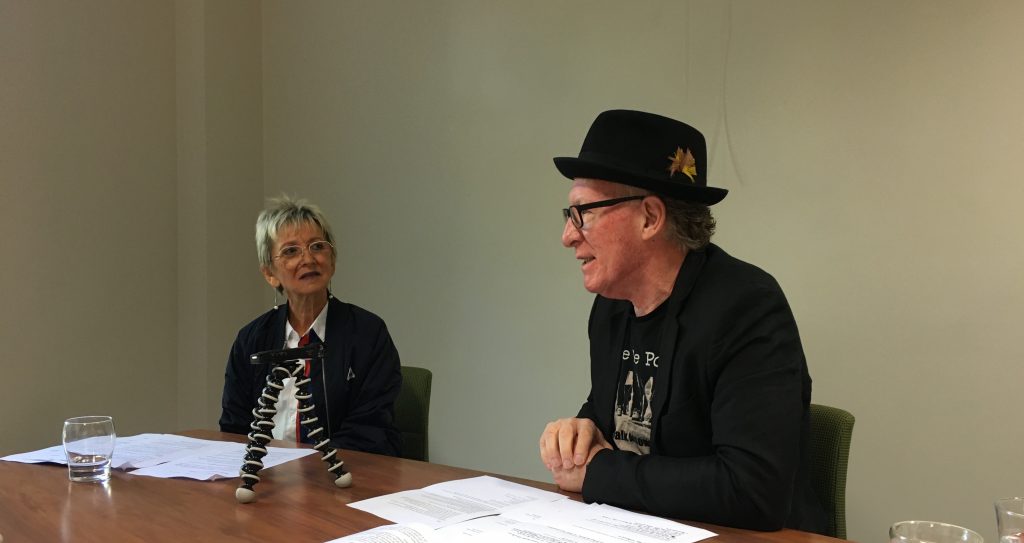How do you inspire young poets?
Poetry Podcast No.2.
This is the second instalment of a recent discussion I shared with Corinne Kaplan, an educator with a passion for literacy. We had the opportunity to sit and discuss what inspires young poets. It formed part of the Arts Learning Festival conducted by the Independent Schools of Victoria.
In this episode, we discuss how you encourage young poets to find inspiration. Think small: their own treasures and the objects, the things around them.
And what if they can’t find the right word? Well, it’s perfectly okay to make one up…
If you are willing to stay with us until the end, I will share two of my poems from the recently published anthology, 'What the Poemster Found'.
The Words That Come At Night
Sometimes
The words of unwritten poems
Slide into bed next to me
They nestle on my pillow
And whisper in my ear
Write me down
Write me down
-Remember me
In tomorrow’s early light
Soft echoes at the edge of
sleep
Implore me to
Commit to memory
Sweet refrains and edgy
fragments
These faint murmurings
These wannabe words of
unwritten poems
Settle as cobweb fine
Final thoughts
Last visitors
Before
sleep swallows the room.
Alan j Wright, 'What The Poemster Found.'
Where Does My Poetry Hide?
Where does my
poetry hide?
It snuggles in
snatches of conversations
floating down the
street
It rocks about in
my collected treasures
Junky and jumbled
I look for it in
lettuce, limes and lemons
In asparagus,
apples, even anchovies
It might be sealed
a packet of peppermints
A jar of peanut
butter
Escaping with
aromatic intensity
Poetry washes up on
the shoreline
in clusters of
seashells
Glittering sea
glass
Seaweed and wet
sand
I seek it out in a
song’s refrain
And voices in a
playground
I find it nestling
in my favourite books
It emerges in
isolated words
-and fabulous
fragments
Angry and otherwise
It swirls in the
mumbles and whispers rumbling
against the
internal walls of houses.
It develops in
photographs that magically reveal my history
Poetry soothes me
in sonorous voices on the radio
And thunders at me
on stormy mornings
I can spot it in a day
old newspaper article
Or a marescent
autumn leaf
Poetry reveals
itself in a small child’s eyes
It announces itself
in simple pleasures,
Or recollections of
days long past
It is minute like
smidgens and skerricks
Things barely seen
or blown to smithereens
It is immense like
boulders, bridges and reservoirs
I hear poetry in
the morning carols of magpies
I wake each day
knowing it’s out there
waiting for me to
discover its hiding spots
-Coming, ready or
not!
Alan j Wright, 'What The Poemster Found.'



Alan, one of those silver linings of this time is that I have a bit more time to listen to a podcast. This was a really delightful chat. I'm an educator who looks for ways of brining poetry to student readers and writers. Thank you!
ReplyDeleteAnd, the idea of ideas for poetry in your poem above are so fun. They really do slide into bed next to me. Ha!
Linda, I'm pleased you were able to quarantine a little listening time, and that you found something of value in the conversation and the poems.
DeleteI remember those same caroling magpies singing their poetry to me when I lived in Australia. :) Thank you for sharing this interesting conversation and your delightful poems, Alan!
ReplyDeleteMichelle, those magpies are a morning delight. Glad you liked the conversation and the poems.
DeleteLOVE the poems! One of the benefits of distance teaching/learning is that I can toss out invitations that have no strings attached. These are perfect ways to remind students that poetry is always within their reach!
ReplyDeleteGlad you enjoyed the poems Mary Lee. Keep tossing out those invitation...
DeleteThis podcast is excellent - I'll be sharing with my teaching students. And, as always your poems are excellent too. I love: "I wake each day knowing it’s out there
ReplyDeletewaiting for me to discover its hiding spots".
Thank you Sally. It pleases me to think this conversation can contribute in some small way. I'm glad you liked the poems too.
Delete